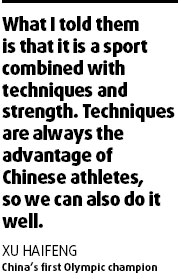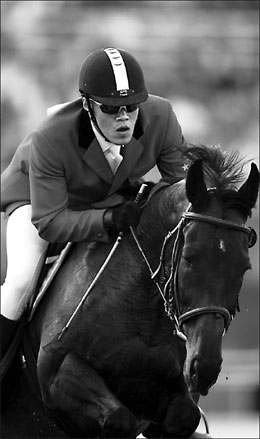Xu lends Olympic weight to pentathlon
|
China's Qian Zhenhua, the first modern pentathlon non-European world champion, competes in the horse riding at the 2007 World Cup Final in Beijing last Saturday. Qian finished 9th overall. Xinhua |
Xu Haifeng etched his name into Olympic history by winning China's first Olympic gold in the 1984 men's 50m pistol - and he may soon be instrumental in the country's first podium finish in the pentathlon.
As a shooting coach, his charges Li Duihong and Tao Luna continued his glorious legacy by clinching two more Olympic golds - in 1996 and 2000.
Now Xu is sharing his Midas touch with China's modern pentathlon team, which he hopes will surprise the home crowd in Beijing next August.
"I like my job position now, since it has taught me a lot of new things," said Xu, who departed the shooting scene in November 2004 shortly after the Athens Olympic Games.
"If I want to gain achievement in my career, I have to cover more fields and accumulate more experience, which will be helpful."
While shooting is among the five disciplines of pentathlon, most of the five-sport event is new territory for the accomplished Olympian.
After studying the rules for months, Xu's competitive insight quickly paid off.
Nine months after he took the new position, China's Qian Zhenhua became the first Asian world champion at the 2005 Pentathlon World Championships in Warsaw.
European athletes have dominated the sport, which entails shooting, fencing, swimming, horse jumping and running, since it became an Olympic event in 1912.
"Qian is the first non-European world champion," Xu said proudly.
"It has encouraged the sport in China a lot, as well as in the whole Asia."
Xu said the first thing he did was to instill confidence in his team.
"What I told them is that it is a sport combined with techniques and strength," he said. "Techniques are always the advantage of Chinese athletes, so we can also do it well."
Pentathlon was first contested in China in 1981 and still boasts just 120 registered athletes.
Until 2004, China's best performance was fourth at the World Championships.
But even the highly successful Qian's career has not been that smooth.
At the 2000 Sydney Olympics, he settled for last position no thanks to a harsh fault call in the horse ride that gave him a blank score.
He finished seventh twice at two World Championships in 2001 and 2003 and finished a modest 16th place at the 2004 Athens Games.
"The mental outlook of the team is much better now, and it's time for them to achieve better results," Xu said.
At the Tokyo Asian Championships in May, the first Olympic qualifier for Beijing 2008, the entire Chinese pentathlon team, two men and two women, qualified for next year's Olympics.
In the ensuing World Championships in Berlin, Qian finished 20th, while teammate Cao Zhongrong settled for 11th.
Last weekend, Qian and Cao finished ninth and 10th respectively at the 2007 World Cup Final in Beijing, where athletes got the chance to familiarize themselves with the venues and competition in an Olympic test event.
Qian and Cao will contest the men's event for China, while the final two women will be decided through team selections.
"Both our men's and women's team are above the average level in the world," Xu said.

"Modern pentathlon requires balance and power in all five disciplines and one fault in any discipline will cost the points. So it is hard to predict our fortune at the Olympics, but we will try our best."
Running is always the weakest discipline for Chinese pentathletes, who also perform modestly at fencing, but Xu is convinced China's prospects are bright.
"We will make more efforts to improve those two weakness," Xu said.
"I'm very confident that the Chinese modern pentathlon will have a bright future, since we have great advantages in those disciplines requiring tactical skills, such as shooting, fencing and riding.
"If we build up our confidence and work harder, I believe we could raise up to the world's top eight soon."
In order to make the sport more attractive, the International Modern Pentathlon Union (UIPM) is considering combining the shooting and running at future Olympics.
Xu believes such a move would benefit the Chinese.
"Chinese pentathletes, even those in Asia, are good at shooting, but do not do well in running.
"If they combine those two as one discipline, we will make up the big gap with the European athletes in running," Xu said.
Xu revealed the UIPM would soon hold its annual meeting in South Africa to discuss whether the new rules will be applied at the 2012 London Olympic Games.
(China Daily 09/20/2007 page22)



















